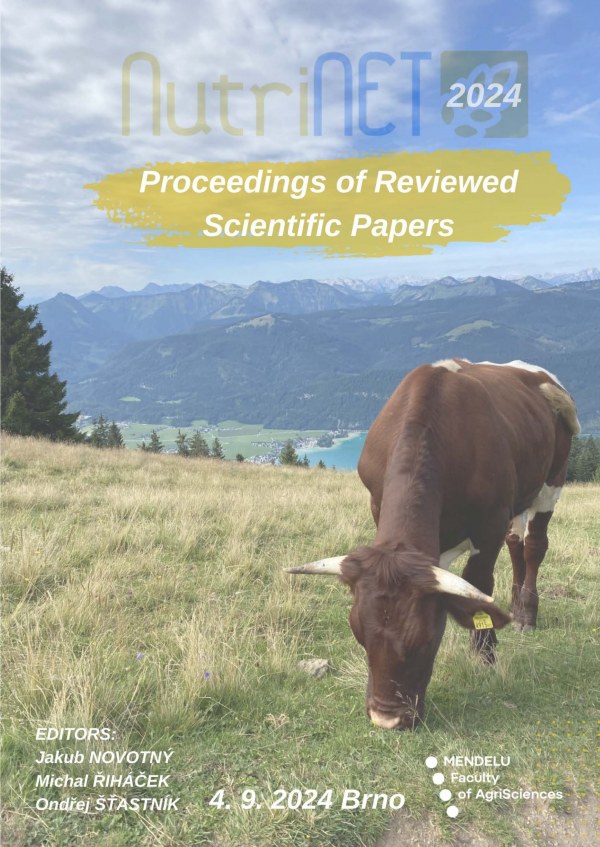
DOI: 10.11118/978-80-7509-994-5-0115
EFFECTS OF FATTY ACID ESTERS AND PHYTOGENIC FEED ADDITIVES ON PERFORMANCE AND HEALTH STATUS OF GROWING PIGS EXPOSED TO HEAT STRESS
- RENATA KUČEROVÁ1, PAVEL HORKÝ1
- 1 Department of Animal Nutrition and Forage Production, Faculty of AgriSciences, Mendel University in Brno, Zemedelska 1, 613 00 Brno, Czech Republic
The objective of this experiment was to evaluate the impact of phytoadditives and fatty acid esters on heat-stressed pigs, focusing on final weight, average daily feed intake, average daily weight gain and health biomarkers. A mixture of short- and medium-chain fatty acid esters was used in the study (butyric, caproic, capric, lauric acid monoacylglycerol ester) with a concentration of 51% in combination with steroidal and triterpenoid saponins derived from Glycyrrhiza glabra (licorice), Quillaja saponaria (soapbark tree) and Trigonella foenum-graecum (fenugreek) are referred to as glycyrrhizin, diosgenin and quillaja saponins, respectively. The experimental group exhibited improvements in fattening parameters compared to the control group: final weight increased by 8.5%, weight gain increased by 10.2%, and feed intake increased by 4.9%. Additionally, the health status of the experimental group was affected, evidenced by a 15.6% increase in cortisol activity, a 44.5% decrease in haptoglobin levels and a 12.7% increase in heat shock protein-70 levels compared to the control group. These findings suggest that feed supplements comprising fatty acid esters and phytogenic substances can mitigate the adverse effects of heat stress, enhancing performance and health status of the organism.
Keywords: gut health; DanBred; saponins; performance; blood analysis
pages: 115-126, online: 2024
References
- Akbarian, A., Michiels, J., Degroote, J., Majdeddin, M., Golian, A., & De Smet, S. (2016): Association between heat stress and oxidative stress in poultry; mitochondrial dysfunction and dietary interventions with phytochemicals. Journal of animal science and biotechnology, 7, 1-14.
 Go to original source...
Go to original source... - Batovska, D. I., Todorova, I. T., Tsvetkova, I. V., & Najdenski, H. M. (2009): Antibacterial study of the medium chain fatty acids and their 1-monoglycerides: individual effects and synergistic relationships. Polish journal of microbiology, 58(1), 43-47.
- Belhadj Slimen, I., Najar, T., Ghram, A., & Abdrrabba, M. (2016): Heat stress effects on livestock: molecular, cellular and metabolic aspects, a review. Journal of animal physiology and animal nutrition, 100(3), 401-412. https://doi.org/10.1111/jpn.12379
 Go to original source...
Go to original source... - Cantet, J. M.; Yu, Z.; Ríus, A. G. Heat Stress-Mediated Activation of Immune-Inflammatory Pathways. Antibiotics 2021, 10, 1285. https:// doi.org/10.3390/antibiotics10111285
 Go to original source...
Go to original source... - Cervantes M, Sakkas P, Soto M, Gómez AJ, Camacho RL, Arce N, Quilichini N, Morales A. A Capsaicin-Based Phytogenic Solution Improves Performance and Thermal Tolerance of Heat-Stressed Growing Pigs. Animals. 2024; 14(6):973. https://doi.org/10.3390/ani14060973
 Go to original source...
Go to original source... - Churchward, C. P., Alany, R. G., & Snyder, L. A. S. (2018): Alternative antimicrobials: the properties of fatty acids and monoglycerides. Critical reviews in microbiology, 44(5), 561-570. https://doi.org/10.1080/1040841X.2018.1467875
 Go to original source...
Go to original source... - Eugen, K. V., Nordquist, R. E., Zeinstra, E., & Staay, F. J. V. (2019): Stocking Density Affects Stress and Anxious Behavior in the Laying Hen Chick During Rearing. Animals: an open access journal from MDPI, 9(2), 53. https://doi.org/10.3390/ani9020053
 Go to original source...
Go to original source... - Flees, J., Rajaei-Sharifabadi, H., Greene, E., Beer, L., Hargis, B. M., Ellestad, L., Porter, T., Donoghue, A., Bottje, W. G. and Dridi, S. (2017): Effect of Morinda citrifolia (Noni)-Enriched Diet on Hepatic and plane of nutrition on metabolism in growing pigs. Journal of Animal Science, 91(5), 2108-2118. https://doi.org/10.2527/jas2012-5738
 Go to original source...
Go to original source... - Pearce, S. C., Sanz-Fernandez, M. V., Hollis, J. H., Baumgard, L. H. and Gabler, N. K., (2014): Short-term exposure to heat stress attenuates appetite and intestinal integrity in growing pigs. J. Anim. Sci. 92:5444-5454. doi:10.2527/jas.2014-8407.
 Go to original source...
Go to original source... - Pearce, S. C., Sanz-Fernandez, M. V., Torrison, J., Wilson, M. E., Baumgard, L. H. and Gabler, N. K. (2015): Dietary organic zinc attenuates heat stress-induced changes in pig intestinal integrity and metabolism. J. Anim. Sci. 93:4702-4713. doi:10.2527/jas.2015-9018.
 Go to original source...
Go to original source... - Rooks, M. G., & Garrett, W. S. (2016): Gut microbiota, metabolites and host immunity. Nature reviews immunology, 16(6), 341-352.
 Go to original source...
Go to original source... - Yan, Y. E., Zhao, Y. Q., Wang, H., & Fan, M. (2006): Pathophysiological factors underlying heatstroke. Medical hypotheses, 67(3), 609-617
 Go to original source...
Go to original source...


